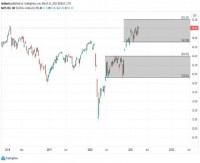|
Among the vast literature of the Muslim world - be that mathematics, poetry, economics or most-recently banking & finance - the Rihla (or Journey) of Ibn Battuta stands out for many. This is a revealing account of life in the 14th century and a significant exploration of the world as seen by this Moroccan judge and legal scholar. Ibn Battuta would set out on his first hajj pilgrimage at the age of 21 and his travels would take him to almost every corner of the Muslim world and beyond. He would set out from Morocco, into Egypt, Syria and Saudi Arabia. Thereafter expanding his travels to Persia, Turkey and several years in the Maldives and India. His travels would stretch as far as China and Spain, finally seeing him back in Morocco after almost three decades on the road. Needless to say, his travels were extensive and the full title of the Rihla (written by scholar Ibn Juzzay) reflects on this vast undertaking: "A Gift to Those Who Contemplate the Wonders of Cities and the Marvels of Travelling". One can find several parallels between his journey and that of Islamic finance, both are witness to how different and diverse the world can be. This piligrim could have returned home to Tangier after his first hajj in 1325, but he chose to forge ahead. We can speculate over his motives but certainly his inquisitive nature gave him sufficient courage to face pirates, storms, illness as well as the impetus to interact with a wide range of rulers, courts and territories. The Islamic finance industry has been equally adventurous perhaps without the pirates but certainly able to navigate rough seas, resilient to malaise, and embedding itself into a wide range of jurisdictions. Oddly enough Ibn Battuta would bear witness to the ravages of the bubonic plague (reporting on how it practically wiped out Marrakech) just as the Islamic finance industry has observed the global financial meltdown (which in turn practically wiped out other trader-towns). He would recount multiple conflicts, rebellions, and occasional brushes with despotic rulers, just as the industry has toiled through verdicts, court rulings and misconception in 'far away' lands. What kept him going (we speculate) was the vast opportunity that lay not in each single territory but in the cross-border interaction between them all. A fragmented world perhaps - but one holding great promise (if only he might have had the communication tools that we have today). He often expressed striking observations of local cultures but this in itself gives his accounts a personal touch that the diplomatic Marco Polo rarely exhibited. Despite being a close contemporary to Marco Polo, Ibn Battuta has remained on the sidelines of history. Perhaps his adventures are chronologically imperfect (he never kept a diary that we know of, instead dictating to Ibn Juzzay mostly by memory) and current historians debate whether the indeed traveled to every place that is claimed (nevermind that Marco Polo failed to mention chopsticks after years in China). Then again, Islamic finance might have been on the sidelines of finance for quite some time. It hasn't followed a 'chronological' growth either as it has yet to fully explore the gamut of vanilla products at its disposal, albeit some feel comfortable dabbling in exotics anyway. On the other hand the industry has yet to be fully tested in a hostile financial territory of its own, although it has learned much from the cracks exposed in conventional markets. Perhaps the main difference is that Ibn Battuta's journey ended several centuries ago, while Shariah compliant finance keep finding new territories to explore. Ironically, the Rihla and Ibn Battuta were destined to oblivion if it not were by chance and the efforts of some western academics. In fact, the scarce manuscripts of the Rihla remained unnoticed until the early 19th century and even then it isn't until the mid-19th century that European translations arrive (notably the work from Charles Defermery and Beniamino Sanguinetti) thus popularizing his exploits to a wider audience. One must wonder if Islamic finance has been equally under-reported and whether insufficient market data has contributed to its obscurity. Moreover, it seems that western bankers have only recently (and gradually) began to decipher this financial manuscript. Some might argue that it is in need to be re-discovered by a global audience - perhaps requiring a new 'translation' for digestion by a readership of conventional bankers. One must wonder if we would be talking about participatory banking if it not where for the contrast provided by fractional banking. Curiously the Rihla was initially translated to English, German and French and so it seems that the same countries are finding it equally appealing to study and analyze the journey of Islamic finance. Whatever drove Ibn Battuta on his travels is lost in time, but we can certainly ask what is driving Islamic finance today. What are the intentions of its participants? Why not just return to Tangier and retire? The signs for the industry are quite promising: we are witnessing reinvigorated frameworks and structural changes aimed as accelerating cross-border collaboration and unification of efforts. The discourse surrounding the need for standardisation (with many detractors) is evolving into the need for industry coordination (undeniably necessary). Efforts to market the industry and its products - while important - are giving way to efforts aimed at enhancing the communication between market participants. Most importantly, Islamic finance is being rediscovered by a wider audience and this financial journey is proving to be as intriguing as that of the 14th century legal scholar. |
Opalesque Islamic Finance Intelligence
Editor's Note: Revisiting Ibn Battuta By Bernardo Vizcaino, CAIA |
|





 RSS
RSS








